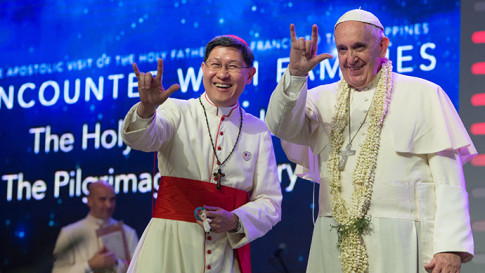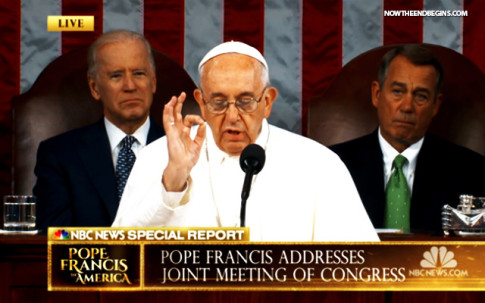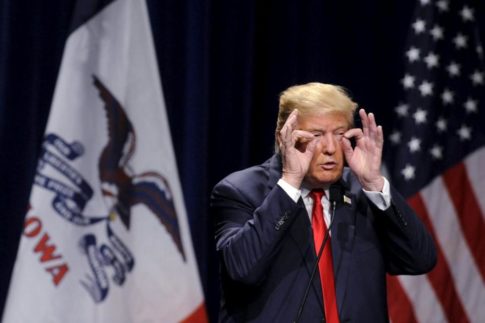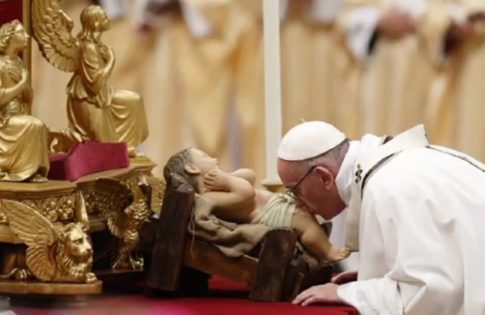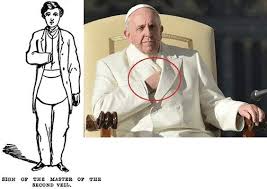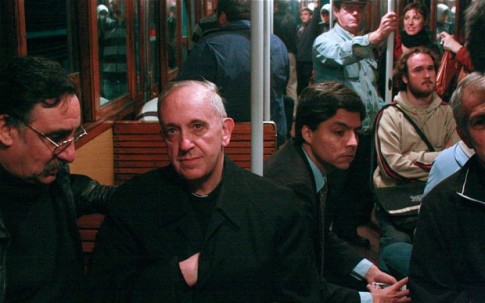– Pope Francis Warns Against “Saviours” Like Hitler, But Says “We Must Wait And See” On Trump:
In an extended interview with Spanish newspaper El Pais granted as Donald Trump was being sworn in as US president, Pope Francis warned against populism, saying it could lead to the election of “saviors” like Hitler, while condemning the idea of using walls and barbed wire to keep out foreigners.
Joining the long ranks of pundits who have compared Trump to Hitler – if indirectly – and Trump’s regime, only in its second day to fascism, the pontiff said that “of course crises provoke fears and worries,” but added that for him “the example of populism in the European sense of the word is Germany in 1933 “Germany… was looking for a leader, someone who would give her back her identity and there was a little man named Adolf Hitler who said ‘I can do it’.”
“Hitler didn’t steal the power,” the pope said “his people voted for him, and then he destroyed his people.” The Germans at that time also wanted to protect themselves with “walls and barbed wire so that others cannot take away their identity,” he said.
“The case of Germany is classic,” he said, adding that Hitler gave them a “deformed identity and we know what it produced.”
Then, having made it clear how he feels about Trump, the Pope tried to back down, saying that it was too early to pass judgement on Trump. “I think that we must wait and see. “I don’t like to aniticpate events. Let us see what he does, we can’t be prophets of disasters.” Well, actually, if the Pope is right, Trump can, which is why he won.
Some highlights from the interview:
Q. Your Holiness, about the world’s problems that you have just mentioned, Donald Trump has just become the president of the US, and the whole world is tense because of it. What do you think about that?
A. I think that we must wait and see. I don’t like to get ahead of myself nor judge people prematurely. We will see how he acts, what he does, and then I will have an opinion. But being afraid or rejoicing beforehand because of something that might happen is, in my view, quite unwise. It would be like prophets predicting calamities or windfalls that will not be either. We will see. We will see what he does and will judge. Always on the specific. Christianity, either is specific or it is not Christianity.
It is interesting that the first heresy in the Church took place just after the death of Jesus Christ. The gnostic heresy, condemned by the apostle John. Which was what I call a spray religiousness, a non-specific religiousness. Yes, me, spirituality, the law… but nothing concrete. No, no way. We need specifics. And from the specific we can draw consequences. We lose sense of the concrete. The other day, a thinker was telling me that this world is so upside down that it needs a fixed point. And those fixed points stem from the concrete. What did you do, what did you decide, how do you move. That is what I prefer to wait and see.
* * *
Q. Both in Europe and in America, the repercussions of the crisis that never ends, the growing inequalities, the absence of strong leadership are giving way to political groups that reflect on the citizens’ malaise. Some of them —the so-called anti-system or populists— capitalize on the fears in face of an uncertain future in order to form a message full of xenophobia and hatred towards the foreigner. Trump’s case is the most noteworthy, but there are others such as Austria or Switzerland. Are you worried about this phenomenon?
A. That is what they call populism. Which is an equivocal term, because, in Latin America, populism has another meaning. In Latin America, it means that the people —for instance, people’s movements— are the protagonists. They are self-organized, it is something else. When I started to hear about populism in Europe I didn’t know what to make of it, I got lost, until I realized that it had different meanings. Crises provoke fear, alarm. In my opinion, the most obvious example of European populism is Germany in 1933. After [Paul von] Hindenburg, after the crisis of 1930, Germany is broken, it needs to get up, to find its identity, a leader, someone capable of restoring its character, and there is a young man named Adolf Hitler who says: “I can, I can”. And all Germans vote for Hitler. Hitler didn’t steal the power, his people voted for him, and then he destroyed his people. That is the risk. In times of crisis, we lack judgment, and that is a constant reference for me. Let’s look for a savior who gives us back our identity and lets defend ourselves with walls, barbed-wire, whatever, from other peoples that may rob us of our identity. And that is a very serious thing. That is why I always try to say: talk among yourselves, talk to one another. But the case of Germany in 1933 is typical, a people that was immersed in a crisis, that looked for its identity until this charismatic leader came and promised to give their identity back, and he gave them a distorted identity, and we all know what happened. Where there is no conversation… Can borders be controlled? Yes, each country has the right to control its borders, who comes and who goes, and those countries at risk —from terrorism or such things— have even more the right to control them more, but no country has the right to deprive its citizens of the possibility to talk with their neighbors.
* * *
Q. Both in Europe and in America, the repercussions of the crisis that never ends, the growing inequalities, the absence of strong leadership are giving way to political groups that reflect on the citizens’ malaise. Some of them —the so-called anti-system or populists— capitalize on the fears in face of an uncertain future in order to form a message full of xenophobia and hatred towards the foreigner. Trump’s case is the most noteworthy, but there are others such as Austria or Switzerland. Are you worried about this phenomenon?
A. That is what they call populism. Which is an equivocal term, because, in Latin America, populism has another meaning. In Latin America, it means that the people —for instance, people’s movements— are the protagonists. They are self-organized, it is something else. When I started to hear about populism in Europe I didn’t know what to make of it, I got lost, until I realized that it had different meanings. Crises provoke fear, alarm. In my opinion, the most obvious example of European populism is Germany in 1933. After [Paul von] Hindenburg, after the crisis of 1930, Germany is broken, it needs to get up, to find its identity, a leader, someone capable of restoring its character, and there is a young man named Adolf Hitler who says: “I can, I can”. And all Germans vote for Hitler. Hitler didn’t steal the power, his people voted for him, and then he destroyed his people. That is the risk. In times of crisis, we lack judgment, and that is a constant reference for me. Let’s look for a savior who gives us back our identity and lets defend ourselves with walls, barbed-wire, whatever, from other peoples that may rob us of our identity. And that is a very serious thing. That is why I always try to say: talk among yourselves, talk to one another. But the case of Germany in 1933 is typical, a people that was immersed in a crisis, that looked for its identity until this charismatic leader came and promised to give their identity back, and he gave them a distorted identity, and we all know what happened. Where there is no conversation… Can borders be controlled? Yes, each country has the right to control its borders, who comes and who goes, and those countries at risk —from terrorism or such things— have even more the right to control them more, but no country has the right to deprive its citizens of the possibility to talk with their neighbors.
Full interview in English link
* * *
PayPal: Donate in USD
PayPal: Donate in EUR
PayPal: Donate in GBP
